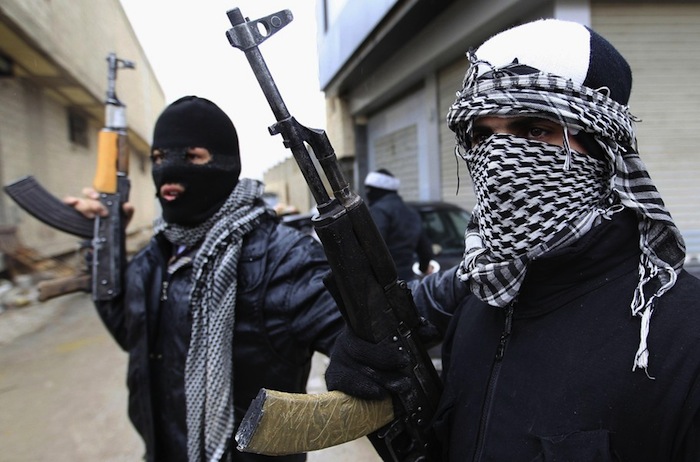 Here’s a marriage made in hell: low-information jihadist fellows stoked on the Koran and unlimited amphetamines, which is now the situation in war-torn Syria.
Here’s a marriage made in hell: low-information jihadist fellows stoked on the Koran and unlimited amphetamines, which is now the situation in war-torn Syria.
The drug of choice is captagon, a somewhat milder form of amphetamine known more generally as Fenethylline that was used for a while to treat attention deficit disorder in kids.
The speed is not only keeping Muslims awake to kill for days at a stretch, it is also funding the war. The easily produced drug generates hundreds of millions of dollars yearly, keeping combatants supplied with material needs.
Normal negotiation probably won’t work in such a drug-crazed environment; Secretary of State John Kerry should be equipped with with crates of downers rather than precise peace plans when he does diplomatic visits.
Remember, alcohol consumption, even beer, is a considered by Islam to be major sin, one that can get imbibers killed. But chomping down stimulants to fuel 24/7 warfare against fellow Muslims and everyone else, as in Syria, has gotten no fatwas from religious elites.
Meanwhile, busybody resettlement advocates recently testified before Congress that Washington should admit 12,000 Syrian refugees this year.
Around 90 percent of Syrians are Muslim, so why don’t some of the wealthy Islamic states take them in? America has too many already.
Syria’s civil war sparks boom in drug trade as both sides get high on amphetamines to fight without sleep, National Post, January 13, 2014
Syria has witnessed a large rise in the use and manufacture of amphetamines as fighters on both sides of its civil war use the drugs for stamina in battle.
The conflict has turned it into a major consumer and exporter of the drugs, which are said to generate hundreds of millions of dollars in profits each year.
The main stimulant in question is Captagon, the former brand name of a drug first used as an antidepressant in the West in the Sixties. It is now banned in most countries because of its addictive properties.
According an investigation by the Reuters news agency, government forces and rebel groups accuse one another of using Captagon to fight prolonged battles without sleep. The pills, which many ordinary Syrians are also increasingly turning to, sell for between $5 and $25.
Captagon is often made by amateur chemists in makeshift laboratories. Production is cheap and simple, requiring “only basic knowledge of chemistry and a few scales”, according to Ramzi Haddad, a Lebanese psychiatrist.
“It gives you a kind of euphoria,” he said. “You’re talkative, you don’t sleep, you don’t eat, you’re energetic.”
A drug control officer in the central city of Homs said that he had observed the effects of Captagon on protesters and fighters held for questioning. “We would beat them, and they wouldn’t feel the pain,” he said. “Many of them would laugh while we were dealing them heavy blows.”
Khabib Ammar, a Damascus-based media activist, said Syrian fighters involved with the drugs trade were buying weapons with the money that they made.
The reports came as the U.S. secretary of state, John Kerry, continued to put pressure on Syria’s warring sides to attend an international peace conference in Geneva that is due to start on January 22.
Diplomats fear the talks may be fruitless, because of the insistence of rebel factions that President Bashar al-Assad cannot be allowed to stay in power.
Sunday, at a meeting of the U.S.-led “Friends of Syria” group in Paris, Ahmad Jarba, the leader of Syria’s opposition National Coalition, reiterated that Assad and his family could have no rule in the country’s future.